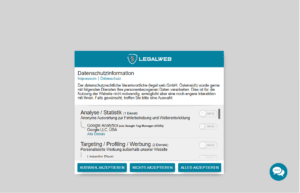Use hCaptcha GDPR compliant. Follow these instructions:
Services & integrations
Back
The GDPR compliant use of hCaptcha
First of all, we have to clarify whether consent is required in order to integrate hCaptcha GDPR compliant.
Since the use of hCaptcha can potentially transfer data to a third country without an adequacy decision, processing requires the user's consent (Art. 49(1) a GDPR), whereby the risks of data transfer must be pointed out so that the user can make a well-informed decision.
A data processing agreement must be concluded with Intuition Machines, Inc. that meets the criteria of Art. 28 GDPR.
The documents must be archived so that they can be proven to the supervisory authority if necessary.
1. Obtain explicit consent for hCaptcha from users by opt-in
Before hCaptcha becomes active on the website and begins to collect user data, the user must first give their explicit consent. If the user refuses to consent, which must also be possible - hCaptcha must not be activated. No data is allowed to be forwarded to the 3rd party. This opt-in procedure is mandatory in order to comply with data protection regulations.
2. Always offer the option to revoke the consent (opt-out) for hCaptcha
Even if the user has agreed to the use of hCaptcha, he or she must still be given the opportunity to reverse this decision and deactivate tracking at any time. For this reason, it is necessary to provide an opt-out procedure that is easy for the website visitor to access at any time. The user must be able to revoke his consent. The option to revoke must be just as easy as the option to consent.
3. Mention hCaptcha in the privacy policy completely, simply and transparently
The privacy policy on your website must be comprehensive, transparent and accurate. It should be readable and understandable by anyone, even without legal training. It is important to include a section on hCaptcha that clearly describes what data is collected, for what purpose it is used and who is responsible for it, as well as whether data is shared and what legal basis applies.
Privacy Statement for the Service hCaptchaWhen accessing some sub-services of our website, additional personal services are processed. Processed data categories: technical connection data of the server access (IP address, date, time, requested page, browser information)data about the use of the website and the logging of clicks on individual elements. Purpose of processing: avoid non-human and automated input. The legal basis for processing: a legitimate interest that overrides the rights and freedoms of the data subject (Art. 6 (1) f GDPR). Legitimate interests: strong economic interest in safe and functioning operation of the technical systems. Data is transmitted: to the data processor Intuition Machines, Inc., 1065 SW 8th St #704, Miami FL 33130, USA (https://www.hcaptcha.com). This may also mean a transfer of personal data to a country outside the European Union. The data is transferred to the USA on the basis of Art. 45 GDPR in conjunction with the European Commission's adequacy decision C(2023) 4745, since the data recipient has committed to comply with the data processing principles of the Data Privacy Framework (DPF). 4. Additional Information for hCaptcha and GDPR
In addition to the above information, the data protection information must also contain the mandatory information from Art. 13 or 14 GDPR: Name and contact details of the controller, if necessary the contact details of the data protection officer, the purposes for which the personal data are to be processed, the legitimate interests, if the processing is based on Article 6 (1) f GDPR, the duration of the processing, information on the rights of the data subjects including the right to lodge a complaint with a supervisory authority, the possibility of simply revoking consent given, and information as to whether the Provision of the data is required by law or contract or what the possible consequences of non-provision would be. In the event that the data is used for automated decision-making, including profiling, meaningful information about the logic involved and the scope and impact on the data subject must be provided. The processing of the data must also be documented in the list of processing activities in accordance with Art. 30 GDPR. The information required for this can already be found in the privacy statement, which can be created from the previous information.
5. Formulate the consent in an understandable manner and present it clearly. Do not use dark patterns.
Before the user agrees or rejects the use of hCaptcha, he must be informed in detail about the respective purposes. Therefore, a precisely formulated consent text is of great importance. This should also be placed so that it is immediately recognizable for the user. The user's consent must be active. Individual services must not be preselected.
6. Use a Consent Management Provider CMP (cookie banner/cookie popup/cookie bar)
Different names, but usually the same purpose. CMP supports you with consent (opt-in and opt-out, data protection declaration and other GDPR topics. Technical support is recommended with regard to the GDPR and consent management in order to avoid errors.
Our consent tool for the use of hCaptcha: Legal Web Privacy Cloud CMP





Legal Web Privacy Cloud supports you in the legally compliant integration of hCaptcha. Our Consent Manager platform provides you with the following functions:
- Legally compliant cookie pop-up for opt-in and opt-out
- Complete privacy policy incl. purposes, data categories, recipients, …
- Correct imprint
- Automatic updates when laws change
With Legal Web Privacy Cloud we offer a All-in-one GDPR package for your website and webshop. Worry-free, legally compliant and always up to date with the latest legal bases and support for hCaptcha.
Preconfigured services & integrations
Individually expandable